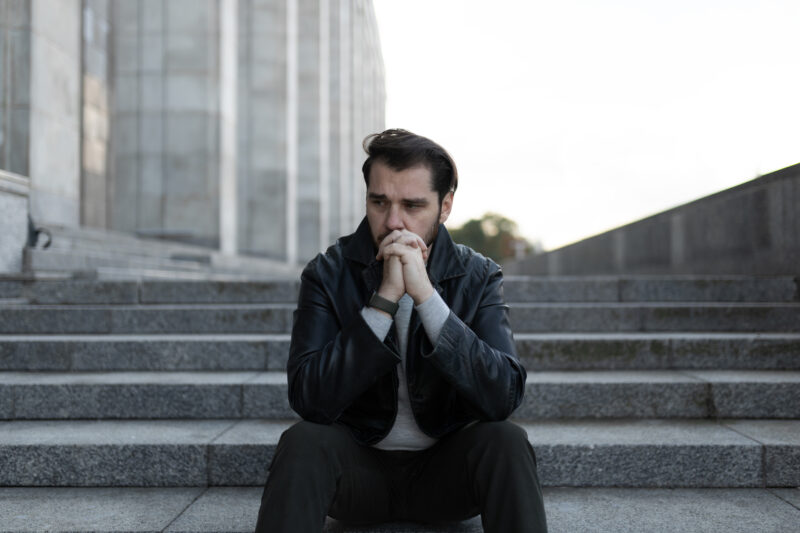
Table of Contents
Yes, Mental Health Conditions Can Make You Not Feel Like Yourself — Here’s Why

Written By: Sarah Fielding

Clinically Reviewed By: Clary Figueroa
November 22, 2024
4 min.
Mental health conditions such as dissociative disorder, bipolar disorder, and schizophrenia can cause you to not feel like yourself.
Learn more about our Clinical Review Process
Table of Contents
Everyone goes through periods of feeling a bit separated from themselves. It might be that you passionately want to do something but find yourself in a completely different role day-to-day. You might even have intrusive thoughts or worries that don’t reflect your outside life or feel in an unusually depressed mood. In essence, there are moments when you don’t feel like yourself.
There are a few things that can cause you to feel this way. “When someone doesn’t feel like themselves, this can come from not living a life parallel with their interests and values,” says Charlie Health Primary Therapist Alysson Thewes, LCSW. “It can also come from not being in tune at all with their larger true passions and goals in life, and thus they feel very out of touch with who they themselves actually are.” Read on to learn why you might not feel like yourself, when this is a sign of a mental health condition, and how to cope with these feelings.

We are here for you
Virtual, compassionate therapy from the comfort of home.
Mental health disorders linked to not feeling like yourself
As mentioned above, there are so many reasons why you might not feel like yourself. But, it could also be a symptom of a mental health disorder. According to Clinical Supervisor Sarah Lyter, LCPC, MA, there are a range of mental health conditions that can make you feel not like yourself. These mental health disorders include:
- Dissociative disorder
- Depersonalization-derealization disorder
- Depression or another depressive disorder
- Anxiety disorder
- Post-traumatic stress disorder (PTSD)
- Bipolar disorder
- Schizophrenia and related psychotic disorders
- Chronic stress
- Borderline personality disorder
Charlie Health Experiential Therapist Julie Eggleston, MS, CTRS, specifically calls out depression, explaining that it can lead to feeling like a shell of yourself, anti-social and tired — different from the person you believe yourself to be. This mental health condition, along with others, can also cause negative feelings, emotional pain, and even thoughts of suicide. If you’re experiencing suicidal thoughts or are in danger of harming yourself, this is a mental health emergency. Contact The Suicide & Crisis Lifeline 24/7 by calling or texting 988.
How to know if you’re experiencing a mental health disorder
It can be challenging to determine on your own whether you’re experiencing a mental health disorder. Lyter recommends taking time to do some serious self-observation. Pay attention to what you’re doing or thinking about when these feelings appear. These pieces can provide insight into what might be to blame for this negative emotion. “Identifying any triggers can give great insight regarding the circumstances of these feelings and if there are any themes or patterns,” says Lyter.
These observations can also provide you with a clearer picture to bring to a medical professional. While there is a lot of information on social media and other online sources, working directly with a mental health professional is critical for getting an accurate diagnosis.

How to cope with not feeling like yourself
Having a mental health disorder doesn’t mean that you will always feel off. Sure, it might come and go — something that can be true for everyone, no matter their mental state — but it, by no means, has to be permanent. You can take steps to cope with not feeling like yourself and even to change that feeling.
How to proceed relies, in part, on whether you live with a mental health disorder and which one you do. A mental health professional can provide coping techniques in therapy based on your experience, symptoms, and triggers. They can also assist you in practicing these coping mechanisms, all of which can be beneficial, says Eggleston.
Talking about how you feel can also provide clarity. As Eggleston puts it, speaking to a loved one or a therapist can help you process your feelings and determine whether mental healthcare would be helpful for you.

How Charlie Health can help
If you’re not feeling like yourself and it’s getting in the way of your mental health, Charlie Health can help. Charlie Health’s virtual Intensive Outpatient Program (IOP) provides mental health treatment for people dealing with serious mental health conditions, including anxiety symptoms, depression, and more. Our expert clinicians incorporate evidence-based therapies into individual counseling, family therapy, and group sessions to make managing your mental health possible. Fill out the form below or give us a call to start healing today.




